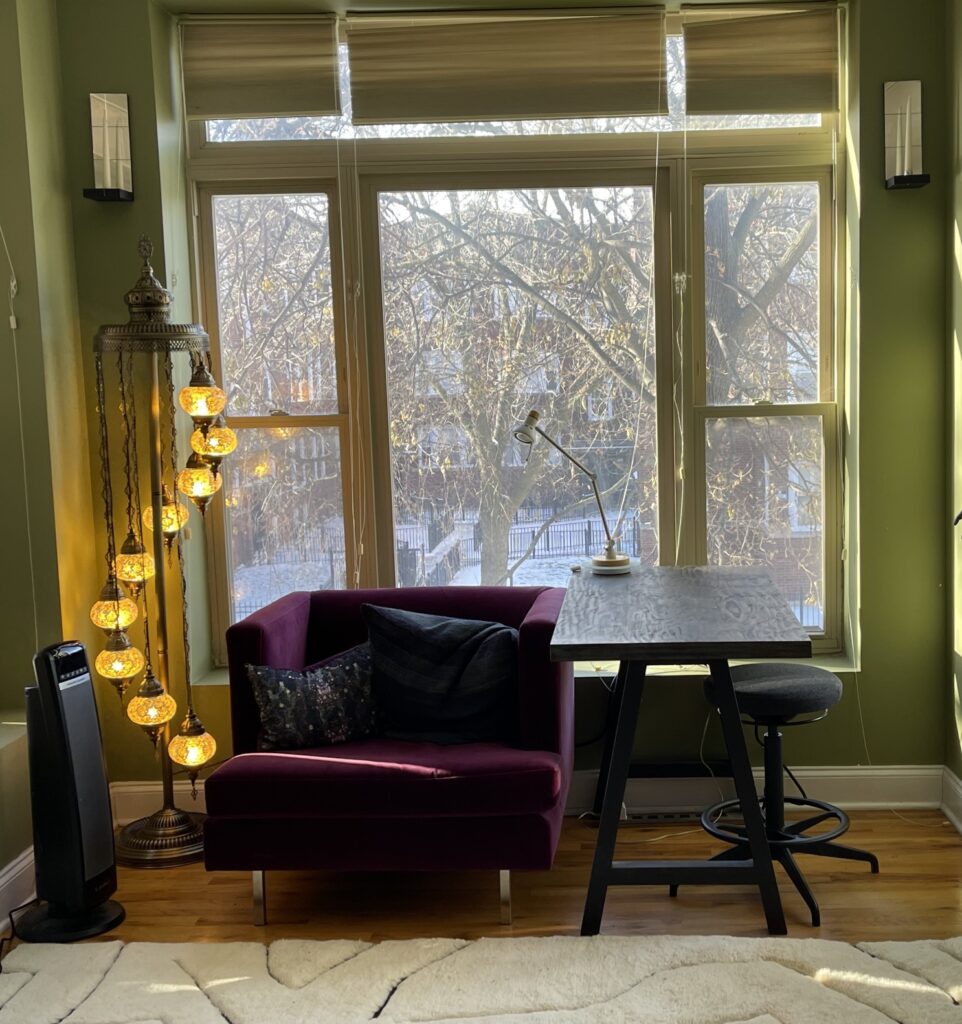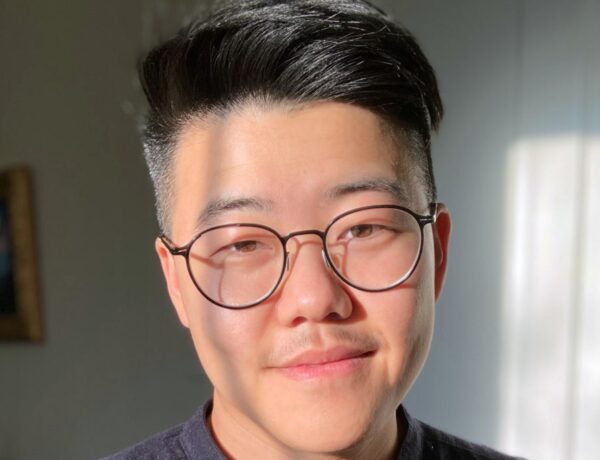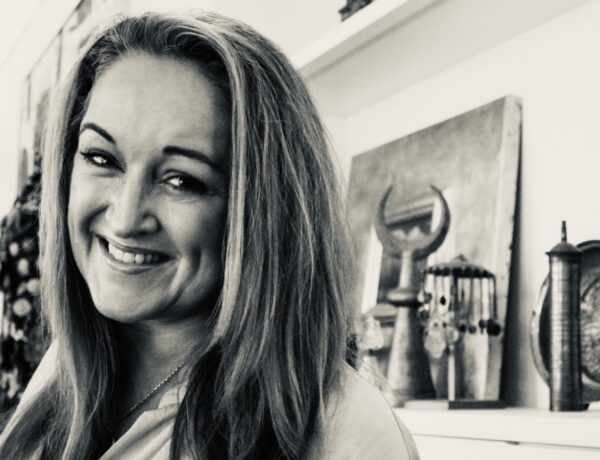Anne K. Yoder is the author of the novel The Enhancers, which was selected as a must-read by Wired, Vulture, and Nylon, and elsewhere.
Her fiction, essays, and criticism have appeared in Fence, BOMB, Tin House, NY Tyrant, and MAKE, among other publications, and has been recognized in Best American Nonrequired Reading.
She is the author of two poetry chapbooks and is a member of the Chicago-based publishing and arts collective, Meekling Press. She writes, lives, and occasionally dispenses pharmaceuticals in Chicago.
Each week, we publish a new daily writing routine from a famous author. Subscribe to our newsletter so you don’t miss out!
Hi Anne, welcome to Famous Writing Routines, we’re so glad to have you here with us today! Can you tell us about your background as a writer and how you came to publish your novel, The Enhancers?
I’ve always wanted to write. I started on a path of studying journalism in college and became disenchanted with it; I ended up finishing school with an unlikely combination of degrees in pharmacy and English literature. From there I moved to Brooklyn, worked at a few magazines and literary journals, including Tin House. All the while I had a part-time job to support these endeavors working the evening shift at the now-defunct St Vincent’s Hospital in the West Village.
At the time I was writing essays, book reviews, and cultural criticism, but I had always desired to write novels. I found my way to embracing the messiness and dynamism of play and process necessary for me to do this, in part, by moving to Chicago and enrolling in an art-school’s graduate writing program (at the School of the Art Institute of Chicago). A healthy dose of psychoanalysis helped too.
It was a journey to publish The Enhancers! The novel went through rounds of submissions and rejections, some warmly enthusiastic and some heartbreaking; it was as much a soul-crushing a slog that is often discussed among writers. Eventually I had the opportunity to publish the novel with Meekling Press, and so I jumped on it.
The book explores the theme of mental augmentation in a techno-pharmaceutical society and questions what it means to know oneself. Can you elaborate on these themes and what messages you hope readers take away from the novel?
The idea of what makes a self, what comprises a belief system, and how a person perceives their narrative, including what they conceal versus what they want to project, is something that I’m fascinated by— and then, what does this mean when influenced by chemicals? If you stop to consider, we’re always perceiving through an array of chemical reactions. These ideas were a starting point.
My ideas on experience, beliefs, and memory have been enhanced by reading William James’s On the Varieties of Religious Experience and Henri Bergson’s writing on Matter and Memory, as well as Deleuze’s Bergsonism.
Life in Lumena Hills, the town in The Enhancers with a pharmaceutical company at its center, is a reflection and intensification of the late-capitalist system we’re living within, in the United States especially. My work in hospital and long-term care led to observations and more questions about care and well-being, and to developing a weariness of profit-driven models of healthcare. And to consider, the leading cause of personal bankruptcy in this country is medical debt.
I’m grateful if readers are curious and think through these experiences and questions within the novel’s construct along with me. My hope is that the book leaves a reader with impressions that stay with them or alter their perception in some way, and that the reader leaves with more questions than answers.
The Enhancers was selected as a must-read by multiple publications such as Wired and Vulture. How did it feel to receive recognition for your work and what was the inspiration behind the novel?
It was a tremendous surprise and delight that The Enhancers was esteemed by critics at Vulture and Wired, and elsewhere too. The coverage exceeded my expectations for publishing with a small indie press. Mostly, I am grateful for the visibility the coverage has given the novel, and that ultimately through this, The Enhancers has found its way into more readers’ hands.
The germ of the idea came to me when I was studying at the School of the Art Institute of Chicago, working as an assistant to bio-artist Eduardo Kac and taking an art history class on art of the 1960s that transformed materialist practices into aesthetic sensations. At the time I was reading Henri Bergson and William James on the nature of experience and thinking a lot about human augmentation.
Do you struggle to stay focused while writing? You’re not alone! That’s why Famous Writing Routines recommends Freedom – the ultimate app and website blocker for Mac, Windows, Android, iOS, and Chrome. With over 2.5 million users, Freedom helps writers stay on task and avoid distractions. Get started for free today and reclaim your productivity!
As a member of the Meekling Press, a Chicago-based publishing and arts collective, can you share your experience being a part of this collective and how it has impacted your writing?
If anything, working with and within Meekling Press has given me more of a sense of possibility and play. It has also influenced the way I think about publishing, especially thinking of bookmaking as a collaborative act. Writing can be such a solitary and heady endeavor that it’s a joy to be able to collaborate on others’ projects, to make physical books, prints, pamphlets, i.e. objects, and to come up with intriguing and at times unlikely ideas to try out.
Your fiction, essays, and criticism have been published in various publications such as Fence, BOMB, and Tin House. How do you approach writing in different genres and what is your favorite type of writing to do?
One of the gifts of studying in an MFA writing program where one doesn’t declare a genre (i.e. poetry, nonfiction, fiction) is finding the freedom of writing beyond boundaries. My favorite critical pieces to write would blend criticism and the personal or would stray from conventional modes of book reviewing, which are often rather uninspired.
However, the main distinction when writing, I find, is mode: my critical mode involves more analytical thinking, while my creative mode operates in more of a dream space. I prefer to engage in creative work either at the beginning or the end of the day, which is closer to sleep and to dream. I’ve also found that indulging my inner critic can really shut down my creative process, so I’ve spent a lot of time finding ways to placate and quiet this voice. I feel like we’ve finally made a truce.
That being said, I’m not sure I’ve ever thought of having a favorite type of writing to do. I’m generally most excited by the project I’m working on at the moment. I’ve found fiction writing to be at times both the most frustrating and the most rewarding.
What does a typical writing day look like for you?
Working part-time in healthcare means that I’ve rarely had the same work schedule week to week, and I’ve worked at all hours of the day. My writing happens in the time that I have free. While my schedule changes, I’ve found that showing up consistently to write is key.
Though when I refer to ‘writing’ this doesn’t always mean putting words on the page — this can be reading or thinking or at times staring at a blank page in service of whatever project I’m working on. Lately I’ve been waking early and writing in the morning. Walks alone or with friends in the late morning or afternoon make for wonderful breaks. If I put in a few hours before anything else, I find the work builds upon itself and that I am better able to engage the rest of the day.
If you could have a conversation with any author throughout history about their writing routine and creative process, who would that person be?
It’s so hard to choose just one! My first thought is Arthur Rimbaud. He dashed off his poems and then left poetry to become an international gunslinger in his twenties. Though I’m not sure we’d get on and I doubt he’d be able to articulate how he possessed such preternatural gifts, and so I’d choose Virginia Woolf, as a beacon for female writers of the twentieth century. She imparted the importance of a room of one’s own to me very early on in my writing life and awed me with To the Lighthouse. I learned so much from Lily Briscoe and was so amused by the sad depiction of Mr. Ramsay’s intellectual self-importance. Woolf continued to write despite her mental storms, and also she and her husband Leonard formed Hogarth Press, which published much of her work.
I’d love to know about the books you’re reading at the moment. What have been some of your favorite reads?
I heartily recommend Martin Riker’s The Guest Lecture, whose entire arc is continued within a night of insomnia in the narrator’s mind as she, accompanied by the John Maynard Keynes of her imagination, attempts to walk through a memory palace for the talk she’s scheduled to give the next day.
Hilary Plum’s essays on art, activism, attention, and labor in her book Hole Studies take a long look at the nature of adjunct labor, and also at Courtney Love and Sinead O’Connor as vocal predecessors for #metoo and our individual (and cultural) need to learn to not just watch but also to listen.
Brenda Iijma and Janice Lee’s A roundtable, unanimous dreamers chime in, which I had the honor of editing, is a gorgeous and heartbreaking and wondrously imaginative collaborative novel, that explores the nature of climate change, interspecies communications and interdependence, the roving nature of consciousness, with nonhuman perspectives.
What does your current writing workspace look like?
I’m in the midst of moving and my writing space is in transition too. I’ve recently reconfigured what was previously a dining area into a cozy and sun-filled writing space with a desk and reading chair and a perch overlooking the street.

Affiliate disclaimer: Some links on this website are affiliate links. We may earn a small commission if you make a purchase through these links, but only promote products we truly believe in. We disclose affiliate links and give honest reviews.



No Comments